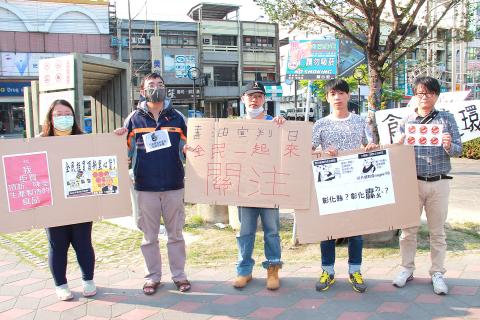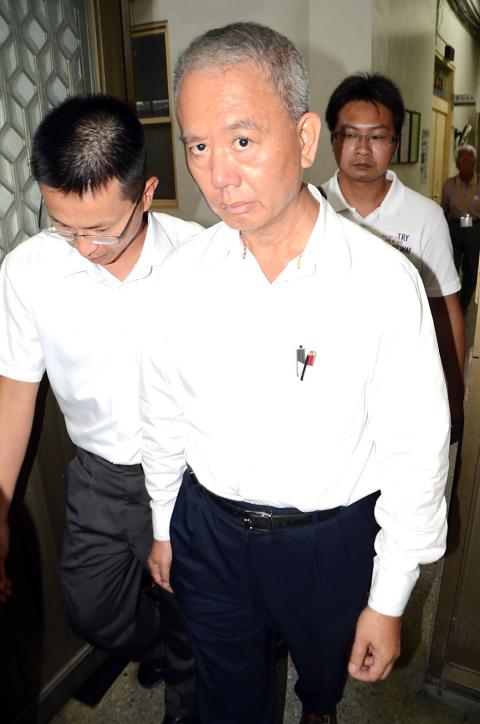Defendants in an adulterated cooking oil case that shook the nation last year, including former Ting Hsin International Group (頂新集團) executive Wei Ying-chun (魏應充), were found not guilty of breaching the Act Governing Food Safety and Sanitation (食品安全衛生管理法) by the Changhua District Court yesterday.
The Changhua County Prosecutors’ Office in October last year charged former Ting Hsin Oil and Fat Industrial Co (頂新製油實業) chairman Wei over violations of the act after investigators found the company had imported animal feed-grade material from Vietnam-based oil manufacturer Dai Hanh Phuc Co (大幸福) and declared it to customs as fit for human consumption. It was then used to make oil for cooking and making pastry.
At the time, prosecutors asked for a 30-year prison sentence for Wei, while asking for 18 years each for 59-year-old former Ting Hsin Oil and Fat general manager Chang Mei-feng (常梅峰), 43-year-old former acting president Chen Mao-chia (陳茂嘉) and 56-year-old Yang Chen-yi (楊振益), the owner of Dai Hanh Phuc.

Photo: Chen Kuan-pei, Taipei Times
The prosecutors also recommended the confiscation of allegedly illegal profits Ting Hsin International Group made from the oil products, totaling NT$440 million (US$13.4 million).
Yesterday’s ruling said prosecutors failed to prove that Ting Hsin Oil and Fat sourced fat extracted from unhealthy animals or that the company’s products were manufactured using unsanitary processes.
The defendants could not be proved to have committed the crimes they were charged with and are therefore not guilty, it said.

Photo: Yen Hung-chun, Taipei Times
The case can be appealed.
Wei resigned as chairman of Ting Hsin Oil and Fat, Cheng I Food Co (正義股份) and Wei Chuan Foods Corp (味全食品工業) — all companies controlled by the family-run Ting Hsin International Group — after the firms were found to be producing questionable oil products.
In a statement released after the ruling, the group said it respects the court’s decision and would accept all criticism from society, adding it would seek to give back to Taiwan, which it considers its home, as much as possible.
Netizens and civic groups reacted angrily to the ruling.
Saying the verdicts were vastly different from what the public expected, many netizens said that the nation’s judiciary was dead.
One netizen sarcastically said that he was glad to hear the ruling because it meant the oil he consumed over the past decade was safe and that he had not consumed tainted oil products for a decade or more.
Homemakers United Foundation secretary-general Lai Hsiao-fen (賴曉芬) called on consumers to boycott Ting Hsin’s products in light of the ruling, adding that consumers should use their autonomy and make corporations pay a price for malfeasance.
Former Taipei District Prosecutors’ Office head prosecutor Hu Yuan-lung (胡原龍), who had been involved in the investigation of the case, said the discrepancy between public expectations and the ruling was due to the hastiness of the Changhua County Prosecutors’ Office.
The Changhua office investigated for only eight days before it indicted the defendants, Hu said, adding that the investigation could not find substantial evidence to back the allegations, which was the prime reason the collegiate benchruled the way it did
The Food and Drug Administration said it would cooperate with the Changhua office to provide evidence, vowing to appeal the ruling.
Linkou Chang Gung Memorial Hospital department of clinical toxicology director Yen Tsung-hai (顏宗海) said that cooking oils have few categories of inspection, most of which only search for total polar compounds and heavy metals, but there could be other harmful ingredients in oils.
National Taiwan University (NTU) toxicology professor Chiang Chih-kang (姜至剛) called on legal amendments to define items that can cause chronic toxicity, while NTU’s Food Safety Center executive officer Hsu Fu (許輔) said the government should grant food inspection controllers more power to prevent food safety incidents.
Additional reporting by Chen Ping-hung and Wu Liang-yi

DAREDEVIL: Honnold said it had always been a dream of his to climb Taipei 101, while a Netflix producer said the skyscraper was ‘a real icon of this country’ US climber Alex Honnold yesterday took on Taiwan’s tallest building, becoming the first person to scale Taipei 101 without a rope, harness or safety net. Hundreds of spectators gathered at the base of the 101-story skyscraper to watch Honnold, 40, embark on his daredevil feat, which was also broadcast live on Netflix. Dressed in a red T-shirt and yellow custom-made climbing shoes, Honnold swiftly moved up the southeast face of the glass and steel building. At one point, he stepped onto a platform midway up to wave down at fans and onlookers who were taking photos. People watching from inside

A Vietnamese migrant worker yesterday won NT$12 million (US$379,627) on a Lunar New Year scratch card in Kaohsiung as part of Taiwan Lottery Co’s (台灣彩券) “NT$12 Million Grand Fortune” (1200萬大吉利) game. The man was the first top-prize winner of the new game launched on Jan. 6 to mark the Lunar New Year. Three Vietnamese migrant workers visited a Taiwan Lottery shop on Xinyue Street in Kaohsiung’s Gangshan District (崗山), a store representative said. The player bought multiple tickets and, after winning nothing, held the final lottery ticket in one hand and rubbed the store’s statue of the Maitreya Buddha’s belly with the other,

‘NATO-PLUS’: ‘Our strategic partners in the Indo-Pacific are facing increasing aggression by the Chinese Communist Party,’ US Representative Rob Wittman said The US House of Representatives on Monday released its version of the Consolidated Appropriations Act, which includes US$1.15 billion to support security cooperation with Taiwan. The omnibus act, covering US$1.2 trillion of spending, allocates US$1 billion for the Taiwan Security Cooperation Initiative, as well as US$150 million for the replacement of defense articles and reimbursement of defense services provided to Taiwan. The fund allocations were based on the US National Defense Authorization Act for fiscal 2026 that was passed by the US Congress last month and authorized up to US$1 billion to the US Defense Security Cooperation Agency in support of the

‘COMMITTED TO DETERRENCE’: Washington would stand by its allies, but it can only help as much as countries help themselves, Raymond Greene said The US is committed to deterrence in the first island chain, but it should not bear the burden alone, as “freedom is not free,” American Institute in Taiwan Director Raymond Greene said in a speech at the Institute for National Defense and Security Research’s “Strengthening Resilience: Defense as the Engine of Development” seminar in Taipei yesterday. In the speech, titled “Investing Together and a Secure and Prosperous Future,” Greene highlighted the contributions of US President Donald Trump’s administration to Taiwan’s defense efforts, including the establishment of supply chains for drones and autonomous systems, offers of security assistance and the expansion of